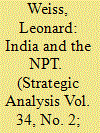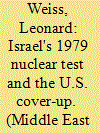| Srl | Item |
| 1 |
ID:
094501


|
|
|
|
|
| Publication |
2010.
|
| Summary/Abstract |
India's nuclear development has been accompanied by a dual track strategy of developing and building weapons while criticising the non-proliferation regime as discriminatory and simultaneously making public statements and proposals in favour of nuclear disarmament. But with international progress likely on aspects of nuclear disarmament over the next few months, India will be in the spotlight at the forthcoming 2010 Non-Proliferation Treaty (NPT) Review Conference to help move the disarmament and non-proliferation agenda forward. This article proposes that India meet this challenge by announcing specific commitments on permanently ending nuclear testing and plutonium production for weapons by a set date. In the course of reaching this conclusion, the article traces the history of India's role in the development of the international non-proliferation regime, its proposals on disarmament, and also its relationship with the United States with respect to India's nuclear development and ambitions.
|
|
|
|
|
|
|
|
|
|
|
|
|
|
|
|
| 2 |
ID:
111107


|
|
|
| 3 |
ID:
091059


|
|
|
|
|
| Publication |
2009.
|
| Summary/Abstract |
Israel has had an arsenal of nuclear weapons since the late 1960's and its current inventory is estimated at between 100 and 200 warheads. Some of these weapons will eventually be or have already been, placed on Israel's missile-carrying submarines, Making them virtually impervious to preemptive military attack. They are or soon will be Israel's invulnerable nuclear deterrent.
|
|
|
|
|
|
|
|
|
|
|
|
|
|
|
|
| 4 |
ID:
051682


|
|
|
|
|
| Publication |
May-Jun 2004.
|
| Summary/Abstract |
Pakistan lied, stole, and conned its way to becoming a nuclear weapons power. Now it's doing the same as a nuclear broker. Will the United States do anything about it?
|
|
|
|
|
|
|
|
|
|
|
|
|
|
|
|
| 5 |
ID:
060920


|
|
|
| 6 |
ID:
079624


|
|
|
|
|
| Publication |
2007.
|
| Summary/Abstract |
On July 5, 2005, President George W. Bush and Indian Prime Minister Manmohan Singh signed an agreement pledging their governments to actions designed to culminate in a formal nuclear cooperation agreement that would end a three-decade U.S. nuclear embargo against India. Although the formal agreement has not yet received final approval from Congress, concerns about the consequences of the agreement, particularly its possible adverse effect on the Treaty on the Non-Proliferation of Nuclear Weapons (NPT) and the worldwide nonproliferation regime, have made the agreement controversial. This article traces the events that led to the Bush-Singh meeting, explicates the current situation, examines the arguments for and against the proposed agreement, and makes some preliminary judgments regarding the agreement's effects on the nonproliferation regime. The failure to prevent India's 1998 nuclear tests with the threat of sanctions (because the Indians calculated that long-term U.S. resolve was not sustainable) set in motion a chain of events that would ultimately end the nuclear embargo. However, the conditions for a better U.S.-India nuclear agreement - from a nonproliferation perspective - will inevitably arise if the current proposed agreement is not adopted
|
|
|
|
|
|
|
|
|
|
|
|
|
|
|
|